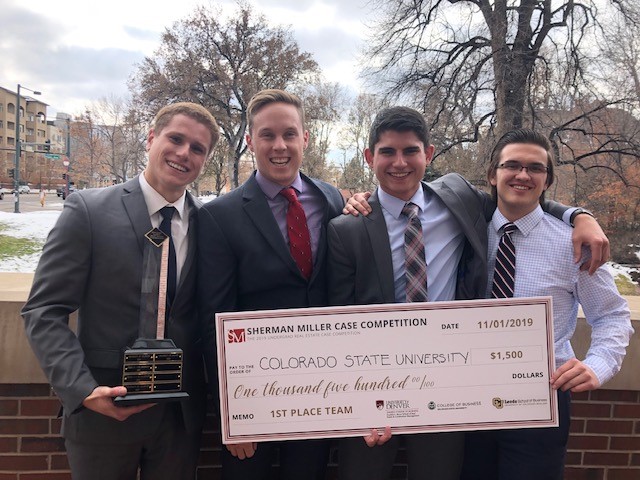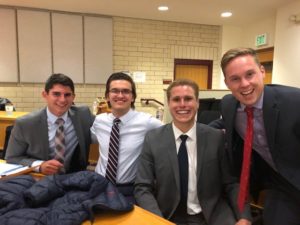
Talking with the students who won first place in the Sherman Miller Real Estate Competition Nov. 1, you wouldn’t know that they had just propelled CSU to its first victory since 2015 in one of Colorado’s most high-profile case competitions. You might not guess that the foursome split a $1,500 prize check, or that they pulled off the victory shorthanded, besting teams with six members from the University of Colorado-Boulder and the University of Denver.
Instead of those marquee accomplishments, they’d rather tell you about how great a time they had doing it.
“We all became pretty good friends,” senior corporate and real estate finance major Matt Gasser said. “I feel like it’s pretty rare that you have a group of four that were just randomly selected and works as well together as we did.”
The team was assembled from students in the College of Business’s Finance and Real Estate major. Gasser was joined by sophomore finance and equine science major Nicholas AmRhein, senior finance and real estate major Will Denton and junior finance and real estate major Scott LaHerran, who are quickly coalescing into a tightknit friend group. Their proposal drew on a lot more than their chemistry—the group used all the knowledge they’ve acquired in their business classes to tackle this year’s challenge, which involved analyzing a retail development in New Orleans to identify key opportunities and risks for an investment firm considering purchasing the property.
Competitors were required to identify capital improvements and renovations and tenant relocation opportunities then create an implementation plan to maximize return on the investment. The case packet included a general overview of basic data – tenant rent rolls, information on traffic flows, local demographics and regional real estate data – and teams could supplement it with any publicly available information. CSU’s group made finding supplemental information the heart of its strategy, as members researched tenants’ bond ratings and the Federal Reserve’s economic projections to better guide its decisions.

“We really tried to differentiate ourselves by going above and beyond and taking a unique problem-solving look at finding information that we felt was missing from the case,” AmRhein said. “We’re four people instead of six people. We went in knowing that we were going to have to put in a lot of work and time and effort, so we tried to really think of ways of how can we do our due diligence.”
As they developed their strategy, members started to see that classroom educational exercises are developed to teach a single concept. In the case competition, much like the real world, issues aren’t as clear cut. The complexity added a dimension that expanded on the team members’ coursework.
“I can take those concepts that I’ve learned in class and use them to start to understand how everything interacts,” AmRhein said. “I feel like that’s a really good thing that you learn in the classroom and then you can really take that and scale it up.”
Gasser agrees. “Doing this type of exercise in a more real-world setting was a little different than you expected,” he said.
The competition forced students to work quickly, giving them only five days to analyze and prepare their presentations. Members of the CSU squad received the case right before their Thursday evening class and didn’t come together until Friday. Coming at a point in the semester chock full of midterms and other academic demands, clearing a weekend to prepare was one of the biggest challenges to getting involved, Gasser said.
Even if there hadn’t been a $1,500 payout at the end of the experience, team members unequivocally say the experience was worth the time in their busy schedules.
“I think case competitions are great. I’d recommend for anyone to go out of their way to do them,” AmRhein said. “They really kind of enhance your learning to a level that you don’t really get in class.”